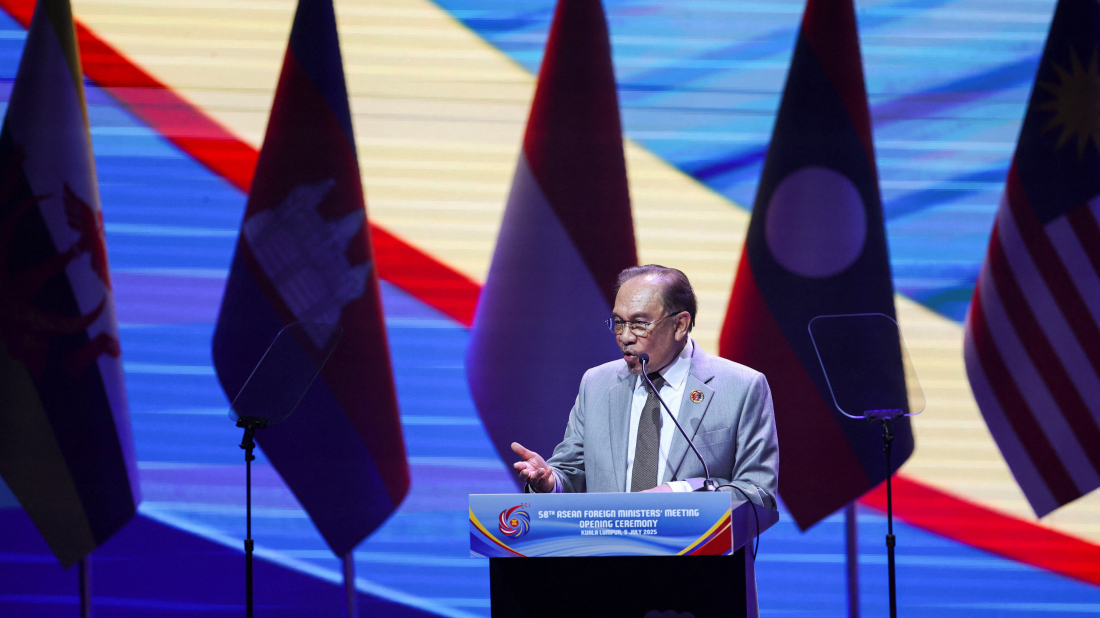Iran signs €500 million arms deal with Russia to restore air defences, FT reports
Iran has signed a secret €500 million arms deal with Russia to rebuild air defences, weakened during last year’s war with Israel, the Financial Ti...

Malaysian Prime Minister Anwar Ibrahim has pledged to fortify the country's semiconductor sector by diversifying partnerships, building local expertise, and deepening ASEAN cooperation.
Malaysia will prioritise resilience in its semiconductor sector by working with trusted partners and strengthening domestic capabilities to guard against global supply chain disruptions and geopolitical tensions, Prime Minister Anwar Ibrahim said on Thursday.
Speaking at the ASEAN Semiconductor Summit 2025, Anwar stressed that the region’s stability and development hinge on collaboration, especially as technology supply chains face increasing uncertainty.
"True supply chain resilience means eliminating weak links, either by producing what we need effectively or securing reliable partnerships to access what lies beyond our domestic capabilities," Anwar said. "In these volatile times, diversifying our options is not just wise, it is essential."
He outlined a shift from a foreign direct investment-first model towards fostering local champions within Malaysia’s well-established semiconductor ecosystem. However, he clarified that this would not deter foreign investors, but rather aim to attract long-term partners committed to knowledge transfer and supply chain strengthening.
"We want long-term collaborators who grow with us, and we will continue to welcome partners who strengthen our supply chains, transfer their knowledge and technologies," Anwar said.
To support this transformation, Malaysia is expanding its pool of skilled engineers to overcome labour shortages in the sector. The country is also contributing to a broader ASEAN-wide strategy that emphasises shared development rather than individual national efforts.
"Malaysia must build on its local strengths to serve a larger regional and global purpose. By strengthening our domestic ecosystem, we are also helping to raise ASEAN's industrial capacity," Anwar said.
The remarks come amid a global race to secure semiconductor supply chains following disruptions caused by the pandemic and intensified competition between major powers. Malaysia is already a key player in the global chip supply chain, accounting for an estimated 13% of global chip testing and packaging capacity, according to data from the Malaysia Semiconductor Industry Association (MSIA).
Anwar’s speech underlines the country's ambition to evolve from a manufacturing hub into a regional innovation leader, while aligning with ASEAN's broader digital and industrial goals.
A seven-month-old Japanese macaque has drawn international attention after forming an unusual bond with a stuffed orangutan toy after being rejected by its mother.
Divers have recovered the bodies of seven Chinese tourists and a Russian driver after their minibus broke through the ice of on Lake Baikal in Russia, authorities said.
President Donald Trump said on Saturday (21 February) that he will raise temporary tariffs on nearly all U.S. imports from 10% to 15%, the maximum allowed under the law, after the Supreme Court struck down his previous tariff program.
Pakistan said it carried out cross-border strikes on militant targets inside Afghanistan after blaming a series of recent suicide bombings, including attacks during the holy month of Ramadan, on fighters it said were operating from Afghan territory.
Iran announced on Saturday (21 February) that it has designated the naval and air forces of European Union member states as “terrorist entities” in a reciprocal move after the EU blacklisted the Islamic Revolutionary Guard Corps (IRGC).
European Union foreign policy chief Kaja Kallas has said the bloc is unlikely to reach agreement on a new package of sanctions against Russia at Monday’s meeting of EU foreign ministers, as continued Hungarian opposition keeps consensus out of reach.
Further Iran-U.S. nuclear talks are scheduled in Geneva on Thursday (26 February) as diplomacy resumes over Tehran’s nuclear programme following earlier mediation efforts. But will the talks move Iran-U.S. negotiations closer to a deal, and what should be expected from the meeting?
China says it's making a "full assessment" of the U.S. Supreme Court's tariff ruling and urged Washington to lift "relevant unilateral tariff measures" on its trading partners, the Chinese commerce ministry said in a statement on Monday (23 February).
Start your day informed with AnewZ Morning Brief. Here are the top news stories for the 23rd of February, covering the latest developments you need to know.
A “Victory will be ours” banner was hung on the Russian Embassy in Seoul, ahead of the fourth anniversary of Russia’s full-scale invasion of Ukraine. It remains on display despite a request from the South Korean Foreign Ministry on Sunday (22 February) for its removal, sparking widespread criticism.
You can download the AnewZ application from Play Store and the App Store.

What is your opinion on this topic?
Leave the first comment